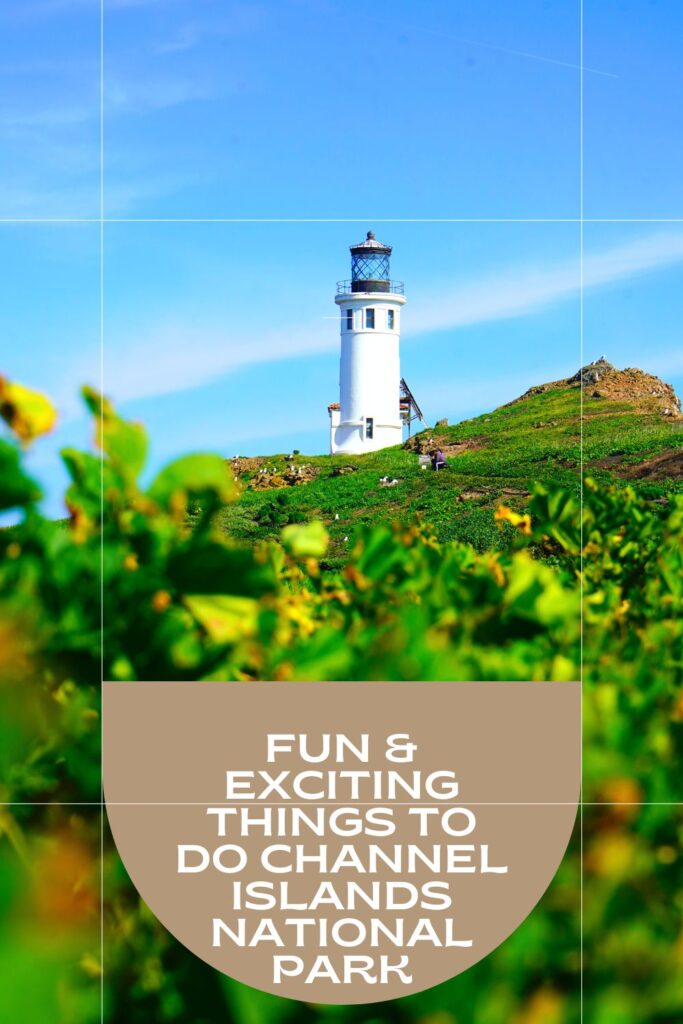
Channel Islands National Park Camping and Things to Do
We may earn money or products from the companies mentioned in this post.
Did you know that Channel Islands National Park is sometimes called America’s Galapagos? Located just off the coast of Southern California, this national park is home to a variety of plant and animal species, many of which are found nowhere else on earth. If you’re planning on a Channel Islands National Park Camping Trip, here’s what you need to know.

Channel Islands National Park is a truly unique place. Comprised of five different islands, the park is home to an incredible array of plants and animals, many of which can be found nowhere else on Earth. And camping on one of the islands is a fantastic way to experience all that this national park has to offer. Here’s everything you need to know about camping at Channel Islands National Park.
Getting There
The first step in planning your camping trip to Channel Islands National Park is getting there. The park is only accessible by boat or plane, so you’ll need to make arrangements in advance. There are several commercial operators that provide transportation to the park, or you can book a spot on a ranger-led boat trip. Whichever way you choose to get there, be sure to give yourself plenty of time to get to your campsite and set up camp before dark.
Channel Islands National Park is a national park located in the Pacific Ocean on the Channel Islands, a group of islands off the coast of southern California. Five of the eight islands belong to the national park.
The Park includes a six-nautical mile stretch of the Pacific Ocean surrounding the islands. Half of the total area of 90 square miles is underwater.

From plankton to dolphins, Californian pelicans, cormorants, sea lions, gulls, and blue whales, the park is home to over 2000 plants and animals. Of these, 145 species, such as the lizard specie Sceloporus occidentalis Becki or the lichen species Caloplaca obamae are endemic.
The park administration maintains two visitor centers on the mainland in Ventura and Santa Barbara and two small so-called visitor contact stations on Santa Barbara Island and Anacapa Island. Access to the islands is regulated by rangers, who issue viewing permits at the visitor center.
The Channel Islands are located just off the Ventura, California coastline. Five islands running from east to west make up this beautiful and diverse National Park. Each island is unique and has its own geographical characteristics and personality.
Visitors arrive at the islands by either plane or boat. There are no food shops on any of the islands. Water should be brought with you as you travel and explore the area.
The islands are approximately 70 miles north of Los Angeles and are a great getaway spot when trying to escape the city for a day. The National Park is open year around with the Visitor’s Center being closed on Thanksgiving and Christmas.
Each island offers many sights and activities and will take up an entire day to explore. Reservations must be made to ride boat concessions to each island. Boat concessionaires charge fees to transport visitors to and from the islands. Private boats may also be taken when traveling from island to island.

–>Camp recipes – kid-approved! – 2 pages
–>Nature scavenger hunt – get outside into nature!
–>Paper games for that possibly rainy day or long car trip – 3 pages. Just click on the image to see it in our Etsy shop!
Climate
The Channel Islands are similar to the Mediterranean when speaking of climate. Temperatures are mild with highs in the 60s and evening lows falling to around 50 degrees. The cool climate makes the Channel Islands an ideal vacation spot, no matter what the season.
The Channel Island National Park and the Channel Islands National Marine Sanctuary have come together to sponsor the lecture series, “From Shore to Sea”. The lectures are free and the public is encouraged to attend.
Each lecture is held at the Channel Islands National Park Robert J. Lagomarsino Visitor Center on the second Wednesday of the month. Lectures start promptly at 7 pm. The lectures are designed to show the importance of the research being done in the waters surrounding the Channel Islands. The Marine Sanctuary also has in place several webcams that allow visitors to view the wildlife of the area in their natural habitat.

Anacapa Island
Anacapa Island is closest to the mainland. The average rainfall on Anacapa is less than 10 inches per year. Steep cliffs surround the island. There are no trees and no dock. To gain access to the island a visitor must climb a metal ladder to reach the walkway that leads to exhibits and points of interest on the island. Anacapa is the home to the biggest breeding colony of gulls in the world. With its sparse vegetation and windswept landscape, Anacapa is full of wildlife and hiking trails that will take an entire day to explore.
Santa Cruz
Santa Cruz is the largest of the Channel Islands. The island is owned partly by the Nature Conservancy, while the National Park controls the remainder. Ranching and human habitation have disrupted portions of the island’s landscape, but progress is being made in attempts to return the island to its natural glory.
Santa Rosa Island
Santa Rosa has a landing strip that makes it the only island that can handle airplane traffic. Santa Rosa is the home of spotted skunks and over 195 species of birds.
San Miguel Island
San Miguel is the winter home of almost 50,000 elephant seals. The seals breed and have their pups on the island. It is the westernmost island and closest to the open ocean. Its terrain is flat and wide open, except for the ghostly remains of trees and plants that no longer grow on the island.
The Channel Islands are home to several endangered species, many of which are found only on the islands in this small grouping. A visit in the spring will find blankets of flowers covering the islands. Vegetation blooms and clear blue skies let the sun shine down on the beauty of the islands.
In the fall, large numbers of elephant seals are seen making their homes along the shore, while blue whales and humpbacks can be seen swimming gracefully offshore.

Channel Islands National Park Camping
The five islands of Channel Islands National Park in California offer unspoiled surroundings that are home to many types of wildlife and sea animals. Camping in the park offers guests the opportunity to connect with these animals and nature in a tranquil setting. This can be beneficial for reducing stress and renewing the mind and body.
Selecting a Campsite
There are 72 campsites at Channel Islands National Park over the 5 islands. They are all primitive and require a reservation. Be prepared for no cell phone reservation, no internet, etc- and the only islands that have potable water are Santa Rosa Island Campground and Santa Cruz Island Scorpion Canyon Campground. All campgrounds have food storage lockers.
There are also no showers at any campground, so come prepared to rough it.
What to Bring
Because Channel Islands National Park is only accessible by boat or plane, you’ll need to make sure you pack everything you need for your trip. This includes food, water, and all of your camping gear. Be sure to pack light; the ferry has weight restrictions. You’ll also need to bring a fishing license if you want to go fishing while you’re in the park.
Location
The islands are accessible only by boat. The campgrounds on the islands are situated away from beaches. Campers must pack their belongings from the boat landing areas to their campsite. The distances range from, 1/2 mile of flat ground at the Santa Cruz campground, to 1 1/2 miles of steep uphill travel to the Santa Barbara campground.
Wind
Campers should take precautions against high winds, especially if they are staying on Santa Rosa or San Miguel islands. Because winds can be especially high on these two islands, each campsite has a windbreak area. It is recommended that, on all islands in the National Park, tents be low to the ground and staked to a heavier object such as a picnic table.
Amenities
All campsites at Channel Island National Park are primitive. There are picnic tables available at each site. Each campground also has pit toilets located within the facility. There is no source of water available, so guests must bring their own. Enclosed gas stoves are located at each campsite for visitors to cook during their stay.

Food Storage
Campers must store their food in an animal and bird-proof container. Food-storage boxes are located at each campsite. Guests may also use any type of container that has a sealed lid. This can include heavy-duty plastic tubs or coolers. On Santa Cruz Island, food may not be stored inside tents even if placed in one of these containers, because of scavenging pigs.
Reservations
Reservations are required in advance for all campsites in Channel Island National Park. These reservations may be made up to five months in advance. They can be obtained by calling the National Park Service directly or via the park’s website. After a reservation is made, confirmation will be mailed to the customer’s home. This document must be presented to park personnel upon arrival.
Gear
No provisions are available on the island, so it is very important for campers to bring the right gear with them. Visitors should bring flashlights with batteries, matches, a first aid kit, sunscreen, sunglasses, and a hat with a visor. It is also a good idea for campers to wear layers of clothing so they will be prepared for unpredictable and changing weather conditions.

Channel Islands National Park Camping Activities
A number of possibilities exist for outdoor activity here. There are a lot of water activities like fishing, boating, kayaking, diving, snorkeling, and swimming. Wildlife viewing is also popular with marine life such as harbor seals, California sea lions, and western gulls.
Whale watching is one of the most popular water activities. There are also a number of tidepools where sea urchins, mussels, and starfish can be observed.
The Channel Islands are a great day trip excursion or an extended backcountry camping vacation spot. The diversity of the landscape and geography of these remarkable islands offers something for everyone.
Places To Stay Nearby
Final Thoughts
There’s no doubt about it–Channel Islands National Park is a truly special place. And camping on one of its five islands is a great way to experience all that this national park has to offer. From its stunning beaches and hiking trails to its incredible wildlife-watching opportunities, Channel Islands National Park has something for everyone. So what are you waiting for? Start planning your trip today!
Like Channel Islands National Park Camping? Check these articles:
- Camping in Bad Weather: Tips for Staying Safe, Dry, and (Mostly) Sane
- Free Car Camping: Guide to the Best Spots
- Campfire Cooking With Kids: A Recipe for Learning, Laughing, and Lifetime Memories
- Best Camping Lighter: Top Picks for 2025
- Tent Camping Essentials: A Guide to Packing Smart and Staying Comfortable
